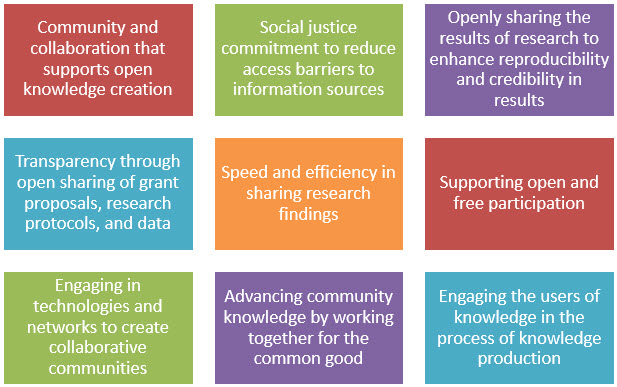While there are a variety of objectives associated with the different aspects of open scholarship, there are also commonly held values that operate across different areas. Some of these values are more prevalent in specific open scholarship areas (e.g. transparency and reproducibility in open science); however, the core values of participation, community building, and free and unrestricted access to research outputs are fundamental to all facets of open scholarship. The following is a list of values held by open scholarship found within the literature:

Martin Weller, in his open access book the Battle for Open, describes some of the motivations that scholars may have for adopting open approaches. These include:
- Increased audience through the removal barriers to people accessing a resource, be it an article, book, course, service, video or presentation. This means it has to be free, easily shareable, online, and with easy rights.
- Increased reuse by allowing others to take what you have created and combine it with other elements, adapt it and republish. The same considerations are required as above, but with an extra emphasis on minimal rights and also creating the resource in convenient chunks that can be adapted. Whereas increasing audiences mean releasing an article online, increasing reuse might lead someone to share the data that underlies it.
- Increased access with the intention is to support particular groups who may be disadvantaged. This may mean incorporating a social justice approach to scholarship or developing strategies such open access admission or courses such that no formal entry qualifications are required to study.
- Increased experimentation through the use of different media or approaches that wouldn’t fit within the normal constraints of standard practice.
- Increased reputation by being networked and online can help improve an individual’s or an institution’s profile. As an academic, operating in the open, publishing openly, creating online resources, being active in social media and establishing an online identity can be a good way to achieve peer recognition, which can lead to tangible outputs such as invites to keynotes or research collaborations
- Increased participation and input through open practices. This could be crowdsourcing in research or getting feedback on a book or research proposal. Being open allows others to access it and then provide the input required.
Additionally, open scholarship can make research and other academic processes more efficient: greater access to scientific inputs and outputs can improve the effectiveness and productivity of the research system, by reducing duplication and the costs of creating, transferring and reusing data; allowing more research from the same data; multiplying opportunities for domestic and global participation in the research process. Open approaches can also improve the quality and integrity of scholarship: open access to scientific outputs, data and other assets that support the research process offer the opportunity of a wider evaluation and scrutiny by the scientific community, thus allowing a greater and more accurate replication and validation of research results.
Finally, by making the processes and outputs of scholarship open, researchers and educators promote awareness, knowledge, and learning among the public. Openness evidence of the outcomes of public funded research and learning can help to build trust and support for public policies and investments. Moreover, it promotes citizen’s engagement and even active participation in scientific experiments and data collection. This engagement can promote collaborative efforts and faster knowledge transfer. This allows better understanding of challenges that require coordinated international actions such as climate change or the ageing population and also could help identify solutions more effectively.

In Their Own Words
Jon Beasley-Murray, Associate Professor, UBC Latin American Studies: “I have always been a strong believer in open access. The university is no ivory tower, and especially at a public university, it is our ethical and political duty to share what we are doing with as broad a public as possible. Otherwise, we are simply pandering to the notion that learning is something that individuals purchase for their own personal self-improvement or betterment. As far as possible, instead of inhabiting educational walled gardens, we should be trying to dismantle the barriers (largely imaginary, in any case) that separate academia from the rest of the world. But we should do so without losing sight of the fact that the university has a logic different from the rest of the world—not least, for instance, in that it refuses the commodification of knowledge, the idea that anything and everything can be bought and sold. Teaching “in the open” drives this point home.”
Surita Jhangiani, Assistant Professor of Teaching, UBC Faculty of Education: “There are many reasons [it is important for instructors to consider using open educational resources], but one factor that particular resonates with me is diversity. Creating OER resources and collaborating with others allows for a diversity of voices and perspectives to be presented. Often textbooks are written from a hegemonic Eurocentric bias, and different ways of knowing and difference experiences are disregarded. OER creates the space to disrupt this landscape and challenge longstanding ways of thinking, which are proving to be harmful. The diversity that can be embedded into OER creates spaces for growth and transformation, which to me is compelling on its own.”
Arthur Gill Green, Affiliate Assistant Professor, UBC Geography: “If we believe education leads to human flourishing and that education is a right, then the use and creation of OER in tandem with effective teaching and learning strategies (that is, open pedagogy) is required to establish and protect that right. Open pedagogy fulfills one of the core commitments to a democratic system by cultivating an informed, educated, and engaged electorate.”
Credit: Material on this page has been adapted from Weller, M. (2014) The Battle for Open. London: Ubiquity Press. DOI: https://doi.org/10.5334/bam, licensed with a Creative Commons Attribution 4.0 license; and What are the benefits of Open Science? by the FOSTER open science consortium, licensed with a Creative Commons Attribution 4.0 license.
